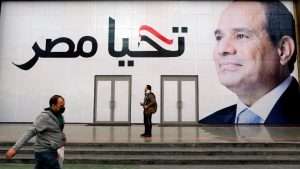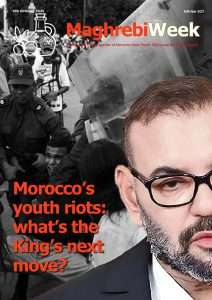Jasim Al-Azzawi: Egypt’s silent crisis and the paradox of stability

Egypt has long been an enigma to the world, a bewildering paradox for over a decade. It appears, outwardly, to be a shining example of stability in the post-Arab Spring world. But this imposed quiet holds a nation quietly suffering under compounded economic and institutional strain. In this land of endless sand and ancient history, a terrible bargain has been struck. After the fleeting and chaotic hope of the revolution, a frightened and exhausted population welcomed the iron fist of President Abdel Fattah el-Sisi. The regime has consolidated its grip on authority and papered over more profound problems: a population time bomb of unemployment, unsustainable debt, and toxic corruption gnawing away at the country’s foundations.

The employment mirage
If you asked Egyptian youth, the formal 6.1 per cent unemployment rate does not ring true. It hides a dark reality. Almost two out of three Egyptians out of work fall within the 15-29 age group, and graduates from university are just under half of those unemployed, according to Egypt’s Central Agency for Public Mobilization and Statistics (CAPMAS). It is a demographic paradox: educated young people with no place to call home.
A nation existing on borrowed time
Since 2011, the nation has opted for grand, military-style infrastructure projects, a new capital, and massive highways at the expense of more prudent investments. These projects are primarily funded through massive foreign loans.
Foreign borrowing currently stands at over $260 billion, with more than $52 billion in debt to multilateral organisations, including the IMF and the World Bank. The current situation places Egypt on a tight fiscal rope. The debt-to-GDP ratio rose to 94 per cent in 2016 and stands at 84.5 per cent as of 2025. All this borrowing has provided false security while mortgaging the nation’s future, much like a couple buying a swimming pool on credit without funding their children’s education.
High price of authoritarian stability
The ousting of the Muslim Brotherhood in 2013 led to unparalleled political stability. Egyptians weary of instability welcomed President Abdel Fattah el-Sisi’s iron fist, a blessing with a high price tag. The regime has increasingly dismantled democratic systems, suppressed opposition, and subjected civil society to unremitting scrutiny. Arbitrary arrests and media censorship are now commonplace.
By stifling dissent and discussion, the government has created a vacuum of institutions, making it increasingly difficult to gauge the mood of the people and address grievances before they escalate to a boiling point. Surface calm could crack under pressure. The press has been muzzled, dissent is met with arbitrary arrest, and the institutions of civil society have been suffocated. The silence is not a sign of consensus; it is the sound of fear, a ticking clock before the pressure boils over and shatters the fragile peace.

Corruption: Systemic and strategic
Egypt ranks 130th of 180 countries on Transparency International’s Corruption Perceptions Index, scoring a paltry 30 out of 100. That’s not a few bad apples; that’s systemic. Military-led economic activity affects markets, resulting in the allocation of contracts to select players through sweetheart deals for state assets and monopoly contracts. In this system, success is determined by who you know, rather than what you can create.
In March 2025 alone, 62 cases of corruption were reported, predominantly in local government and finance. It is a pervasive and ubiquitous tax on the economy that is driving foreign investment away and discouraging innovation, which is essential for generating employment and breaking debt cycles.
The diaspora paradox
Foreign Egyptians sent $23.7 billion between January and October 2024—a 45.3 per cent increase from the same period in the previous year. The influx is a vital lifeline, yet it is a profound paradox. Despite a deep-seated nationalist yearning to return home, expatriates remain hesitant to invest or relocate. Institutional corruption and ineffectual legal institutions deter them. Their money speaks of loyalty, but their hesitation to come home tells the deeper story of a lack of faith in the institutions of their nation. Government efforts, in the form of savings schemes and platforms like InstaPay, fail to keep pace with the issues of failing trust and transparency. Diaspora money speaks volumes of loyalty, but their hesitation to return tells everything.
Strategic vulnerability: From energy giant to dependent
Egypt’s strategic weakness goes beyond the Suez Canal. Egypt’s energy strategy is a stunning reversal. As a regional energy powerhouse exporting natural gas overseas, Egypt now imports from Israel’s Leviathan field, a reversal that is indicative of a profound strategic weakness.
Egyptians weary of instability welcomed President Abdel Fattah el-Sisi’s iron fist, a blessing with a high price tag. The regime has increasingly dismantled democratic systems, suppressed opposition, and subjected civil society to unremitting scrutiny.
The growing population and increasing energy needs have outpaced gas production. While the massive Zohr gas field discovery in 2015 briefly held out the promise of self-reliance, production fell faster than expected due to technical failures and underinvestment. The result: escalating supply shortfalls covered at high prices by expensive LNG imports and cheaper Israeli pipeline gas. This dependence complicates politics and strategy, as gas supplies can be curtailed during regional tensions, which can impact Egypt’s economy and industries.
Conclusion: A country at crossroads
In the 1950s and 1960s, Nasser’s Egypt proclaimed, “No voice should be louder than the battle’s voice,” subordinating democracy to the armed struggle with Israel. Nasser effectively told his people that democratic freedoms were luxuries they couldn’t afford; free press, human rights, and genuine elections would have to wait until Palestine’s liberation. Decades later, nothing happened, and Egypt remains stagnant.
This paralysis serves specific interests. As the second-largest recipient of US aid with an American-supported military, Egypt functions as a crucial client state underpinning US regional policy. Should Egypt break free from corruption and achieve genuine democracy, even a Turkish-style democracy rather than the Westminster model—the implications would be seismic. Iraqis, Syrians, Tunisians, and people from other Arab countries would witness the Egyptian transformation and ask, “Why can’t we do the same?” A democratic, prosperous Egypt would trigger a domino effect, challenging authoritarian leaders throughout the region and undermining America’s grip on the Middle East and North Africa.
Egypt in 2025 is contradictory: political hegemony is replacing consensus, economic progress is being lost to debt and corruption, and diaspora voices are crying out for hope and restraint. The question is not whether Egypt will survive—its history proves an incredible ability to survive. The question is whether it will truly be able to prosper.
READ: Martin Jay: The mirage of Trump’s Gaza peace plan
Victory will not come through megaprojects and military force, but through remaking institutions, restoring trust in a breached social contract, and rebranding leadership that liberates people’s enthusiasm rather than suppressing it. Egypt’s critical mission is to create stable conditions, rather than merely masking the crisis simmering below, and turn them into a foundation for genuine, long-term prosperity.
The views expressed in this article belong to the author and do not necessarily reflect the editorial policy of Maghrebi.org. Jasim Al-Azzawi worked for several media organisations, including MBC, Abu Dhabi TV, and Aljazeera English as a news anchor, program presenter, and Executive Producer. He covered significant conflicts, interviewed world leaders, and taught media courses.
If you wish to pitch an opinion piece please send your article to grace.sharp@maghrebi.org
Want to chase the pulse of North Africa?
Subscribe to receive our FREE weekly PDF magazine













